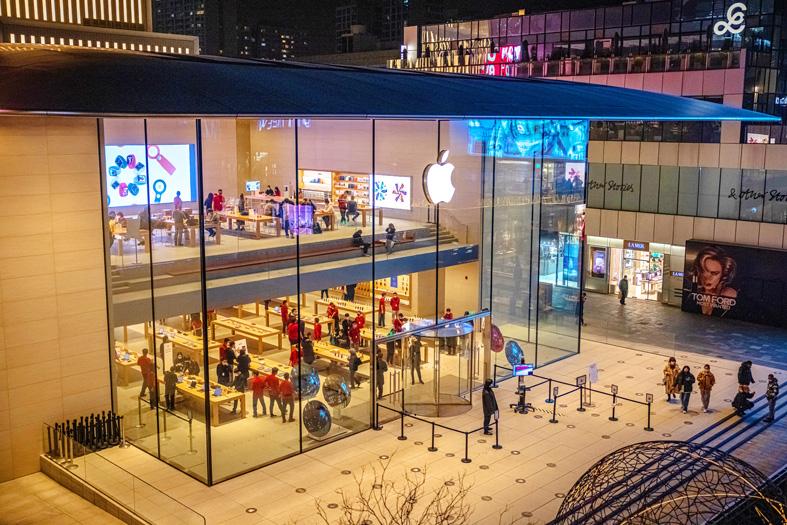Apple Inc, facing a resurgence in COVID-19 cases and the fast-spreading Omicron variant of SARS-CoV-2, is delaying its corporate return-to-office deadline from Feb. 1 next year to a “date yet to be determined.”
Employees were informed of the move via a memo sent by Apple chief executive officer Tim Cook on Wednesday.
An Apple spokesman confirmed the decision to Bloomberg News.

Photo: EPA-EFE
The delay comes just weeks after the company asked employees to begin returning by February, a timeline that had already been pushed back several times.
The lack of a firm date shows the struggle that companies face in trying to get their operations back to normal.
Fellow tech giant Microsoft Corp scrapped its return-to-work date in September.
“We are delaying the start of our hybrid work pilot to a date yet to be determined,” Cook said in the memo. “Our offices remain open and many of our colleagues are coming in regularly, including our teams in Greater China and elsewhere.”
The decision had been made based on “rising cases in many parts of the world and the emergence of a new strain of the virus,” he said.
Cook also strongly encouraged employees to receive COVID-19 vaccinations and booster shots, saying that “this is by far the best way to keep you and your community safe.”
Apple had previously delayed its office-return plans from June, September, October and January. The latest decision comes as the company restored its mask mandate to all US retail stores and temporarily shut three locations because of rising virus cases among employees.
In the memo, Cook also said the Cupertino, California-based company would provide each employee a US$1,000 bonus that might be used for work-from-home needs, saying that it is “in support of our commitment to a more flexible environment.”
That includes retail workers, he added.
“These funds are intended to help you with your home workspace and can be used as you see fit. You will be receiving more information about this shortly,” he said.
When Apple’s staff eventually returns to the office, they would be expected to work in-person on Mondays, Tuesdays and Thursdays. They would be allowed to work from home on Wednesdays and Fridays depending on their team. The company is also offering an additional one month of work-from-home time.
Apple workers would get at least four weeks notice before a new back-to-the-office deadline takes effect, Cook said.
“As we look forward to more of our teams being together again, we will continue to make decisions based on local conditions,” he said.

South Korea’s equity benchmark yesterday crossed a new milestone just a month after surpassing the once-unthinkable 5,000 mark as surging global memory demand powers the country’s biggest chipmakers. The KOSPI advanced as much as 2.6 percent to a record 6,123, with Samsung Electronics Co and SK Hynix Inc each gaining more than 2 percent. With the benchmark now up 45 percent this year, South Korea’s stock market capitalization has also moved past France’s, following last month’s overtaking of Germany’s. Long overlooked by foreign funds, despite being undervalued, South Korean stocks have now emerged as clear winners in the global market. The so-called “artificial intelligence

‘SEISMIC SHIFT’: The researcher forecast there would be about 1.1 billion mobile shipments this year, down from 1.26 billion the prior year and erasing years of gains The global smartphone market is expected to contract 12.9 percent this year due to the unprecedented memorychip shortage, marking “a crisis like no other,” researcher International Data Corp (IDC) said. The new forecast, a dramatic revision down from earlier estimates, gives the latest accounting of the ongoing memory crunch that is affecting every corner of the electronics industry. The demand for advanced memory to power artificial intelligence (AI) tasks has drained global supply until well into next year and jeopardizes the business model of many smartphone makers. IDC forecast about 1.1 billion mobile shipments this year, down from 1.26 billion the prior

People stand in a Pokemon store in Tokyo on Thursday. One of the world highest-grossing franchises is celebrated its 30th anniversary yesterday.

Chinese artificial intelligence (AI) start-up DeepSeek’s (深度求索) latest AI model, set to be released as soon as next week, was trained on Nvidia Corp’s most advanced AI chip, the Blackwell, a senior official of US President Donald Trump’s administration said on Monday, in what could represent a violation of US export controls. The US believes DeepSeek will remove the technical indicators that might reveal its use of American AI chips, the official said, adding that the Blackwells are likely clustered at its data center in Inner Mongolia, an autonomous region of China. The person declined to say how the US government received